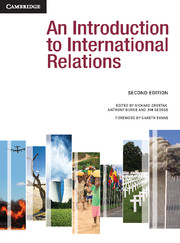Book contents
- Frontmatter
- Contents
- Tables, Figures and Boxes
- Contributors
- Preface and acknowledgements
- An Introduction to International Relations: The origins and changing agendas of a discipline
- 1 Theories of International Relations
- 2 The Traditional Agenda
- 3 The New Agenda
- 21 The United Nations
- 22 Non-State Actors: Multinational Corporations and International Non-Governmental Organisations
- 23 Religion and Secularism
- 24 Global Economic Institutions
- 25 Global Trade
- 26 Global Finance
- 27 Global Poverty, Inequality and Development
- 28 Globalisation and Its Critics
- 29 Global Terrorism
- 30 Post-Conflict State-Building
- 31 Humanitarian Intervention
- 32 Human Rights
- 33 Migration and Refugees
- 34 Global Environmental Politics
- 35 Climate Change
- Glossary of Terms
- Bibliography
- Index
- References
29 - Global Terrorism
from 3 - The New Agenda
- Frontmatter
- Contents
- Tables, Figures and Boxes
- Contributors
- Preface and acknowledgements
- An Introduction to International Relations: The origins and changing agendas of a discipline
- 1 Theories of International Relations
- 2 The Traditional Agenda
- 3 The New Agenda
- 21 The United Nations
- 22 Non-State Actors: Multinational Corporations and International Non-Governmental Organisations
- 23 Religion and Secularism
- 24 Global Economic Institutions
- 25 Global Trade
- 26 Global Finance
- 27 Global Poverty, Inequality and Development
- 28 Globalisation and Its Critics
- 29 Global Terrorism
- 30 Post-Conflict State-Building
- 31 Humanitarian Intervention
- 32 Human Rights
- 33 Migration and Refugees
- 34 Global Environmental Politics
- 35 Climate Change
- Glossary of Terms
- Bibliography
- Index
- References
Summary
Introduction
This chapter provides an overview and analysis of global terrorism. Its main argument is that any understanding of modern terrorism requires an appreciation of how individuals and groups with localised grievances seek to change perceived injustices through acts of violence targeted at a wider national and even global level. The chapter begins with a brief overview of the vexed issue of defining terrorism – a topic that has divided policy-makers and scholars for over a century – and presents a broad working definition of what terrorism is. It then addresses some of the reasons why terrorism is such a controversial subject. The third section shifts focus to the need to understand acts of terrorism within their social and historical contexts – each act of terrorism has its own unique set of historical circumstances even when part of the same general campaign. The fourth elaborates how terrorism is being transformed under conditions of globalisation, focusing in particular on two uniquely modern aspects: the inclination of a growing number of people to redress local grievances through violent actions far from the source of their anger; and the increasing tendency of individuals with no cultural, historical or social ties to a particular conflict to identify with its protagonists and either enlist in faraway terrorist groups or to take matters into their own hands and pursue a violent agenda of their own accord. The chapter concludes with a brief dicussion designed to clear up some misconceptions surrounding terrorism’s root causes.
What is terrorism?
Very few concepts in politics can provoke as negative a reaction as terrorism. Even the debates that swirl around the classification of a person or a government as ‘despotic’ or ‘dictatorial’ pale in comparison with the near-universal opprobrium carried by the concept of a ‘terrorist’. After all, one can claim to be a ‘benign despot’ or a ‘benevolent dictator’, and there are also circumstances in which authoritarian or dictatorial governance is deemed (rightly or wrongly) as acceptable and legitimate. For instance, many people argue that during periods of warfare or social turmoil there is a need to suspend democracy until order is restored. Others argue that authoritarian and non-democratic governance can be culturally sanctioned, which is an argument that is used to legitimate the regimes of countries as diverse as Saudi Arabia and Singapore. However, while some people might be willing under some circumstances to accept being called despotic, dictatorial or authoritarian, almost nobody accepts the label of ‘terrorist’. Even Osama bin Laden rejected strongly the charge that he or his followers were terrorists.
- Type
- Chapter
- Information
- An Introduction to International Relations , pp. 398 - 413Publisher: Cambridge University PressPrint publication year: 2011
References
- 1
- Cited by

